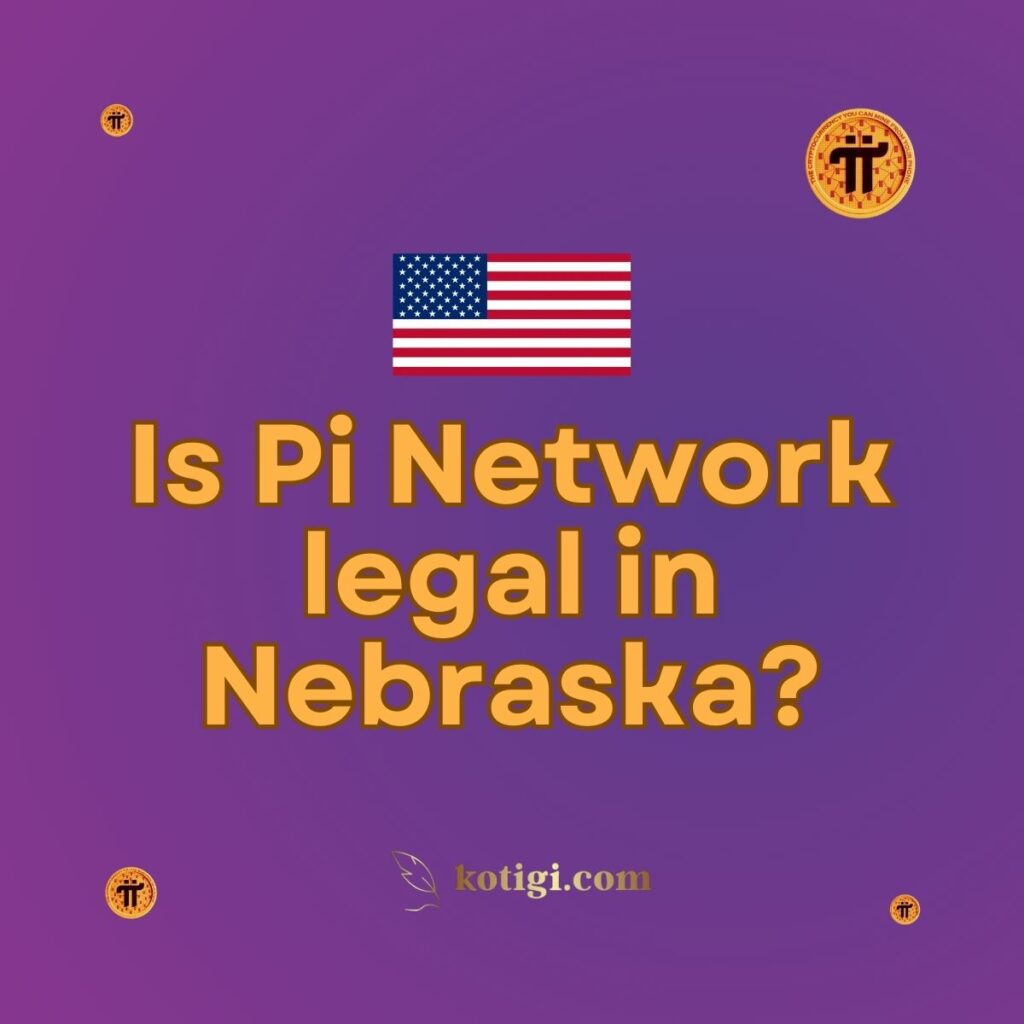
Is Pi Network legal in Nebraska?
Yes, Pi Network is legal in Nebraska. The state follows federal cryptocurrency regulations, but currently has no specific state laws targeting the use or mining of cryptocurrencies like Pi Network. Users should comply with federal requirements such as KYC (Know Your Customer) and tax reporting.
Introduction
As the world of cryptocurrencies expands, so does interest in projects like Pi Network, a decentralized digital currency. Nebraska, with its dynamic business environment, has attracted attention from cryptocurrency users. However, a key concern for Nebraskans is whether Pi Network is legal in their state. While Nebraska has not introduced state-specific laws to regulate cryptocurrencies, users still need to comply with federal laws governing digital currencies. This article explores the legal framework surrounding Pi Network in Nebraska, examining the federal and state-level requirements for users.
Cryptocurrency Regulations in Nebraska
Nebraska, like many other states, has yet to establish comprehensive laws specific to cryptocurrency use and mining. The state generally follows federal cryptocurrency guidelines, which regulate aspects like taxation, anti-money laundering, and KYC policies. As of now, Pi Network operates freely in Nebraska under this regulatory framework.
Nebraska’s Stance on Cryptocurrencies
Nebraska has taken a relatively hands-off approach to cryptocurrency regulation. The state has not introduced any restrictive laws aimed at curbing the use of digital currencies, which has allowed the growing interest in cryptocurrencies, including Pi Network, to flourish. This lack of state-specific regulation is an advantage for Pi Network users in Nebraska, allowing them to participate in the network without facing legal hurdles.
Absence of a BitLicense Requirement
Unlike states like New York, Nebraska does not require a BitLicense for cryptocurrency projects. This means that Pi Network can be used by Nebraskans without the need for a specific license, providing more freedom for users. The absence of restrictive licensing requirements simplifies the process for users to mine and use Pi tokens.
Potential for Future Regulation
Although Nebraska has not yet implemented specific cryptocurrency regulations, the rapid growth of the digital currency space could prompt state lawmakers to introduce new laws in the future. Nebraskans should remain vigilant and stay informed about any potential changes to state regulations that could impact their ability to use Pi Network.
Federal Oversight for Pi Network in Nebraska
While Nebraska does not impose strict state-level regulations on cryptocurrencies, Pi Network users must still comply with federal laws. These laws cover important areas such as KYC compliance, anti-money laundering (AML) measures, and taxation.
Know Your Customer (KYC) Requirements
Pi Network enforces KYC policies to comply with federal regulations. KYC is essential for verifying the identity of users and preventing illicit activities such as money laundering or fraud. Users in Nebraska will need to complete the KYC process to fully participate in Pi Network, ensuring that the network remains secure and compliant with U.S. laws.
Anti-Money Laundering (AML) Compliance
As part of its efforts to align with federal regulations, Pi Network adheres to anti-money laundering (AML) laws. These regulations are designed to prevent the use of digital currencies for illegal activities, such as funding terrorism or money laundering. Users in Nebraska, like elsewhere in the U.S., must adhere to these rules when engaging with Pi Network.
IRS Guidelines on Cryptocurrency Taxation
The Internal Revenue Service (IRS) requires users to report any earnings from cryptocurrency transactions. Although Pi tokens are not yet tradeable, once they become available for exchange, Nebraskans will be expected to report any profits from mining, selling, or using Pi tokens. The IRS treats cryptocurrency as property, meaning that users are responsible for tracking and reporting taxable events related to their Pi holdings.
Legal Considerations for Pi Network in Nebraska
Despite Nebraska’s lenient stance on cryptocurrency regulation, users should be aware of some important legal considerations. Federal tax obligations and compliance with KYC and AML policies are critical aspects of using Pi Network legally in the state.
Cryptocurrency Tax Obligations in Nebraska
While Nebraska does not impose specific state taxes on cryptocurrency transactions, Pi Network users are still subject to federal tax laws. Any earnings from Pi tokens, once tradeable, must be reported as income on federal tax returns. Users should maintain accurate records of their cryptocurrency transactions to ensure compliance with IRS guidelines.
KYC Compliance and Privacy Concerns
While KYC measures help prevent fraud and ensure compliance with federal regulations, some users may have concerns about the privacy implications of providing personal information to verify their identity. Pi Network’s KYC process is designed to protect user data, and the network takes steps to ensure that personal information is handled securely. However, users in Nebraska should be mindful of their privacy rights and take precautions when providing sensitive information online.
Legal Risks of Non-Compliance
Failure to comply with federal laws, such as neglecting to report cryptocurrency earnings or bypassing KYC requirements, can result in legal consequences for users. In Nebraska, as in other states, it is important for Pi Network participants to understand their responsibilities and adhere to all applicable regulations to avoid penalties or legal action.
Blockchain Technology and Nebraska’s Legal Environment
The underlying technology of Pi Network is blockchain, a decentralized ledger that records transactions across multiple computers. Nebraska’s legal environment, while not specifically focused on blockchain, is generally open to technological innovations, including the use of decentralized systems.
Blockchain’s Role in Pi Network
Pi Network relies on blockchain technology to provide a secure and transparent platform for its users. Blockchain’s decentralized nature ensures that transactions are immutable and protected from interference, making it a key component of Pi Network’s operations. In Nebraska, blockchain projects like Pi Network are welcomed as part of the state’s growing tech industry.
Blockchain Adoption in Nebraska
Although Nebraska does not have specific blockchain regulations, the state’s openness to new technologies creates a favorable environment for blockchain adoption. Businesses and individuals in Nebraska are increasingly exploring the benefits of decentralized systems for a wide range of applications, from finance to supply chain management.
Challenges Pi Network Users Might Face in Nebraska
While Pi Network operates legally in Nebraska, there are certain challenges that users may face. These challenges often relate to the broader cryptocurrency landscape in the U.S., where regulations are still evolving.
Uncertainty Around Future Regulations
As cryptocurrencies grow in popularity, there is potential for Nebraska to introduce state-specific regulations in the future. These regulations could impact how users in the state interact with Pi Network, especially if new licensing or compliance requirements are introduced. Staying informed about potential regulatory changes will be important for Nebraskan Pi Network users.
Privacy and Security Concerns
Although Pi Network takes steps to ensure user security, Nebraskans should be aware of the risks associated with digital currencies. Phishing attacks, scams, and fraudulent apps are common in the cryptocurrency space. Users must take precautions to protect their personal information and assets when engaging with Pi Network.
Navigating Tax Obligations
Understanding the tax implications of Pi Network transactions can be challenging, particularly as the IRS continues to refine its guidelines for cryptocurrencies. Nebraskans using Pi Network should consult tax professionals if needed to ensure that they meet all reporting requirements and avoid potential penalties.
Conclusion
Pi Network is legal in Nebraska, where state-level cryptocurrency regulations are minimal, allowing users to participate in the network without significant restrictions. However, users must comply with federal laws, including KYC, AML, and tax reporting requirements. As Pi tokens become tradeable, Nebraskan users will need to stay informed about both state and federal legal changes that could impact their involvement in the network.
Key Takeaways
- Pi Network is legal in Nebraska, with no state-specific regulations currently in place.
- Federal regulations, such as KYC and AML requirements, apply to Pi Network users in the state.
- Nebraska has no additional cryptocurrency licensing requirements, making it easier for users to participate in Pi Network.
- Federal tax obligations must be fulfilled, with Pi Network users expected to report earnings from Pi tokens once tradeable.
- Potential future regulations in Nebraska could introduce new compliance measures for cryptocurrency users, so staying informed is crucial.





